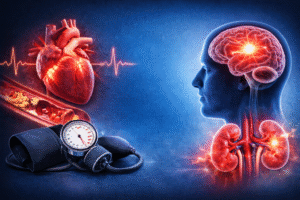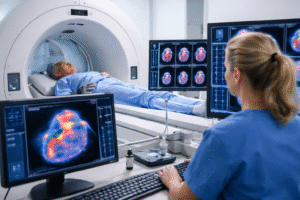Staying Active With Heart Disease: Safe Exercise Tips and Benefits
Staying physically active is one of the most important ways to improve heart health—even for individuals living with heart disease. Regular exercise can strengthen the heart muscle, improve circulation, reduce cardiovascular risk factors, and enhance overall quality of life. However, patients with heart disease often wonder whether physical activity is safe and how to exercise properly without increasing health risks.
Understanding how to stay active safely with heart disease can help patients maintain long-term cardiovascular wellness while reducing complications.
Is Exercise Safe for People with Heart Disease?
For most individuals with heart disease, regular physical activity is not only safe but strongly recommended. Exercise helps improve heart efficiency, lower blood pressure, improve cholesterol levels, and support healthy weight management.
However, exercise programs should be tailored to each individual’s medical condition, fitness level, and treatment plan. Patients should consult a cardiologist before beginning or modifying an exercise routine.
Benefits of Exercise for Heart Disease
Consistent physical activity provides numerous cardiovascular and overall health benefits, including:
Improved Heart Function
Exercise strengthens the heart muscle and improves blood circulation throughout the body.
Lower Blood Pressure
Regular physical activity helps reduce strain on blood vessels and supports healthy blood pressure levels.
Improved Cholesterol Levels
Exercise can increase high-density lipoprotein (HDL) cholesterol and reduce low-density lipoprotein (LDL) cholesterol.
Weight Management
Maintaining a healthy body weight reduces cardiovascular strain and lowers heart disease risk.
Improved Mental Health
Exercise helps reduce stress, anxiety, and depression while improving overall emotional well-being.
Reduced Risk of Future Cardiac Events
Regular physical activity lowers the risk of heart attack, stroke, and disease progression.
Safe Types of Exercise for Heart Disease
Most patients with heart disease benefit from moderate-intensity aerobic exercise combined with strength training and flexibility exercises.
Aerobic Exercise
Aerobic activities improve cardiovascular endurance and circulation. Examples include:
- Walking
- Cycling
- Swimming
- Light jogging
- Low-impact aerobic classes
Strength Training
Strength training helps improve muscle tone and metabolic health. Patients should focus on light resistance training under medical guidance.
Flexibility and Balance Exercises
Activities such as stretching, yoga, and tai chi improve flexibility, reduce injury risk, and support overall wellness.
How Much Exercise Is Recommended?
The American Heart Association recommends:
- At least 150 minutes of moderate aerobic exercise per week
- Or 75 minutes of vigorous aerobic exercise weekly
- Muscle-strengthening activities at least two days per week
Exercise routines should be introduced gradually and adjusted based on individual tolerance and medical advice.
Tips for Exercising Safely With Heart Disease
Patients can reduce exercise-related risks by following several important safety guidelines:
Start Slowly
Gradually increase exercise intensity and duration to allow the heart to adapt.
Warm Up and Cool Down
Proper warm-up and cool-down routines help regulate heart rate and prevent injury.
Stay Hydrated
Adequate hydration supports circulation and temperature regulation.
Avoid Extreme Temperatures
Exercising in very hot or cold conditions can place additional strain on the cardiovascular system.
Follow Medical Advice
Patients should follow individualized exercise recommendations provided by their cardiologist.
Warning Signs to Stop Exercising
Patients with heart disease should stop exercising and seek medical evaluation if they experience:
- Chest pain or pressure
- Severe shortness of breath
- Dizziness or fainting
- Irregular or rapid heartbeat
- Unusual fatigue
- Pain in arms, jaw, or neck
Recognizing these warning signs helps prevent serious complications.
The Role of Cardiac Rehabilitation
Cardiac rehabilitation programs provide medically supervised exercise, education, and lifestyle counseling for individuals recovering from heart attacks, heart surgery, or chronic heart disease. These programs help patients safely rebuild strength and improve cardiovascular fitness.
Who Should Talk to a Cardiologist Before Exercising?
Patients should consult a cardiologist before starting exercise if they have:
- History of heart attack
- Heart failure
- Atrial fibrillation or arrhythmias
- Coronary artery disease
- Valve disease
- Cardiomyopathy
- Recent cardiac procedures or surgery
Personalized exercise plans improve safety and long-term cardiovascular outcomes.
Staying Active With Heart Disease in Tampa, Florida
Patients living in Tampa and surrounding communities—including South Tampa, Hyde Park, Davis Islands, Carrollwood, Westchase, Clearwater, and St. Petersburg—can benefit from comprehensive cardiovascular evaluation and exercise counseling.
At Ascent Cardiology, patients receive advanced cardiovascular screening, stress testing, and personalized exercise recommendations designed to improve long-term heart health and reduce cardiovascular risk.
Preventative cardiology care plays an essential role in helping patients stay active safely.
Lifestyle Changes That Support Exercise Success
Exercise is most effective when combined with other heart-healthy lifestyle habits, including:
- Following a balanced, low-sodium diet
- Maintaining healthy body weight
- Avoiding tobacco use
- Managing stress
- Getting adequate sleep
- Controlling blood pressure, cholesterol, and blood sugar levels
Schedule a Cardiovascular Exercise Evaluation
Exercise is one of the most powerful tools for improving heart health, but safety and personalization are essential. Patients with heart disease should consider cardiology evaluation before beginning or modifying an exercise routine.
Patients in Tampa Bay can schedule a consultation with Sachin Diwadkar, MD, FACC, FASE, at Ascent Cardiology for comprehensive cardiovascular evaluation and personalized exercise guidance.
Medical Disclaimer
The content provided on the Ascent Cardiology website is intended for general educational and informational purposes only. The information, articles, and media presented on this website do not constitute medical advice, diagnosis, or treatment recommendations. Content published on this website is not intended to replace consultation, evaluation, or treatment by qualified healthcare professionals, including the providers at Ascent Cardiology or other licensed medical professionals.
If you believe you may be experiencing a medical emergency, call 911 or seek immediate emergency medical care.
The medical information, opinions, and educational materials presented on this website are provided for general awareness and may not reflect the specific clinical practices or medical opinions of Ascent Cardiology or its providers. Reliance on any information provided on this website is solely at your own risk.
This website may include links to third-party medical or educational websites for informational purposes only. Ascent Cardiology does not control, endorse, or assume responsibility for the accuracy, reliability, or content of any third-party websites linked from this site.

How High Blood Pressure Affects Your Heart, Brain, and Body
High blood pressure—also known as hypertension—is one of the most common and dangerous cardiovascular conditions worldwide. Often called the “silent

Stress and Heart Disease: How to Protect and Improve Your Heart Health
Chronic stress is increasingly recognized as a major risk factor for cardiovascular disease. Many high-performing, Type A individuals juggle demanding

What Is Nuclear Cardiology? Tests, Benefits, and What Patients Should Know
Nuclear cardiology is a specialized field of cardiovascular medicine that uses safe, low-dose radioactive tracers combined with advanced imaging technology